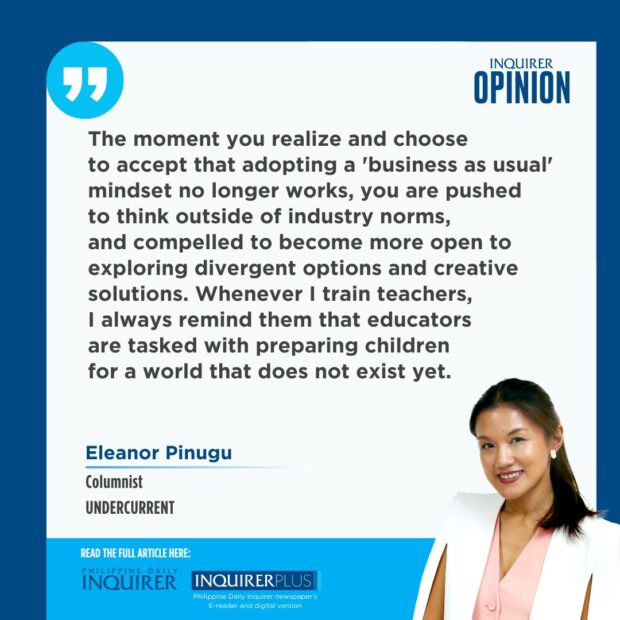Small but deep impact

Small is beautiful, but big is necessary.”
These were the famous words of Sir Fazle Hasan Abed, the visionary founder of the Bangladesh Rehabilitation Assistance Committee (BRAC), one of the world’s largest nongovernmental organizations. He recognized that while small community projects are important, scaleable and comprehensive approaches are necessary to make a significant dent in addressing the world’s pressing problems.
Abed, who passed away in 2019 at the age of 83, devoted his life to growing BRAC: From its modest beginnings in Bangladesh to an organization that now reaches over 100 million people in Asia and Africa through programs focused on education, skills training, microloans, and many other community development initiatives. Even more impressive is that a big chunk of its funding comes from the profits of its different social enterprises.
Article continues after this advertisementIn the development sector, BRAC became our gold standard, and for years, Abed’s words served as my mantra, too. I dreamed about replicating Mano Amiga Academy, the nonprofit school I run, to at least five locations by 2025. And by 2019, it felt like we were on track to make it a reality. We had two very promising offers to set up a school in Laguna and Batangas. I hired a dedicated person to help secure the necessary data to map out the scale-up model and finalize the partnership. We were envisioning 2020 as an incredible year of growth.
Instead, the pandemic happened. The resulting lockdown led not only to the temporary suspension of face-to-face operations but to the permanent closure of some private schools that did not have enough financial runway to deal with the sudden loss of students who were forced to move to public schools due to money constraints. Since our organization largely runs on donations, we also struggled to compensate for lost funding from donors and partners whose incomes were also negatively affected. Suddenly all of our energy and resources were focused on pivoting our existing programs and keeping our one school afloat. Opening new locations now felt like a lofty and unrealistic wish.
Adversity, as various research and examples in history have shown, can be a powerful catalyst for innovation. The moment you realize and choose to accept that adopting a “business as usual” mindset no longer works, you are pushed to think outside of industry norms, and compelled to become more open to exploring divergent options and creative solutions. Whenever I train teachers, I always remind them that educators are tasked with preparing children for a world that does not exist yet. Yes, there is value in implementing “tried and tested” solutions, but not to the point of complacency, where we stop questioning whether those methods are still the most effective approach in our students’ current context.
Article continues after this advertisementMy new mantra in 2020 became: Our mission remains the same, though the methods may be different. Rather than dwell on the opportunities that the pandemic had cost us, my team and I focused on reshaping Mano Amiga’s programs and services to cater to the needs of the students and families we committed to serve. Our academic team worked on designing engaging online classes. We launched a gadget and internet connectivity drive so that all our scholars will have the means to continue their schooling. And because we were no longer constrained by a need for physical space, we also found ourselves growing our various livelihood and education initiatives in scale and reach. Unlike other schools, our enrollment numbers grew. We found new funding partners who enabled us to have online after-school, livelihood, and teacher training programs across the country. In one of our catch-ups the year after, my mentor happily pointed out, “So you did grow. Just not in the way you had planned.”
Last week, Mano Amiga celebrated its 16th anniversary. Although it is still our dream to put up more schools, it is no longer our singular definition of growth. We are expanding our face-to-face after-school programs to different communities in Luzon, Visayas, and Mindanao. We have also come to envision our location in Parañaque as a hub for testing innovations and developing best practices that we use in creating our training and coaching programs to support and upskill public school teachers and administrators.
The other lesson I have learned is not to underestimate the big benefits of smallness. Once in a while, former Mano Amiga scholars would message me and their teachers to share how they are thriving in college. Several parents shared testimonials on our anniversary post on how Mano Amiga helped improve their financial situation and that the school will always be their family’s second home. Being a small school has allowed us to be more attentive and responsive to their needs, and offer more personalized help for our students and their families. The close-knit environment encourages open communication and collaboration and has fostered a strong sense of community.
I believe Sir Abed’s appeal for the need for scale remains true. However, being a small organization does not automatically equate to small support. Depth of impact is just as important and necessary.















